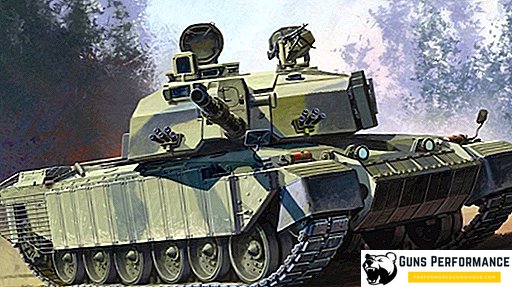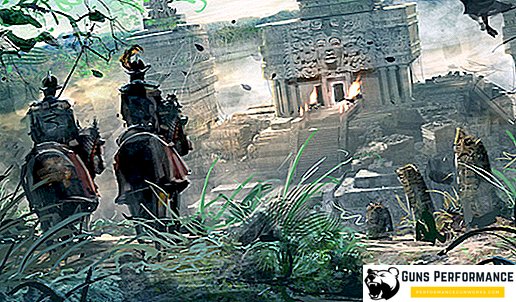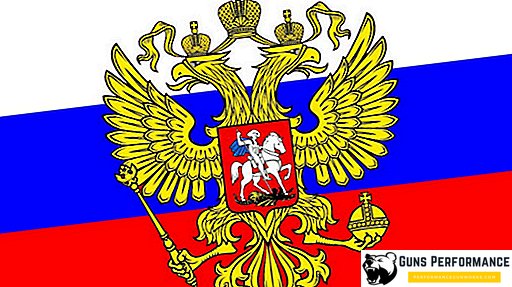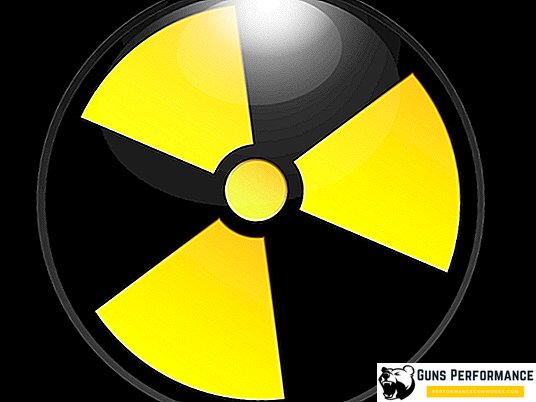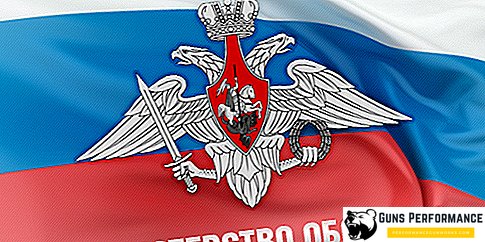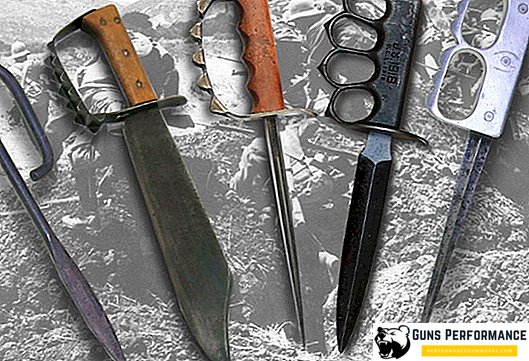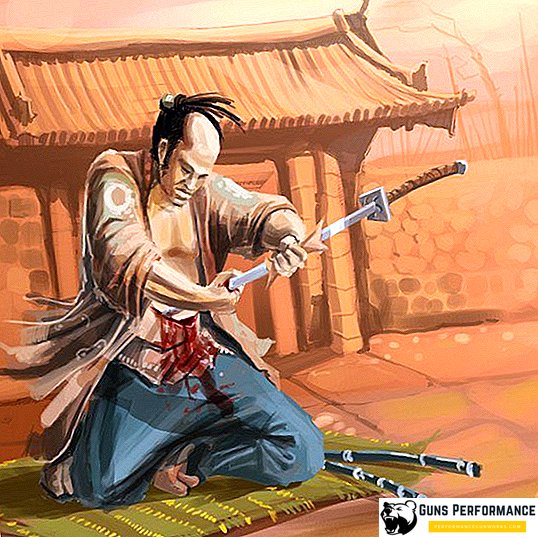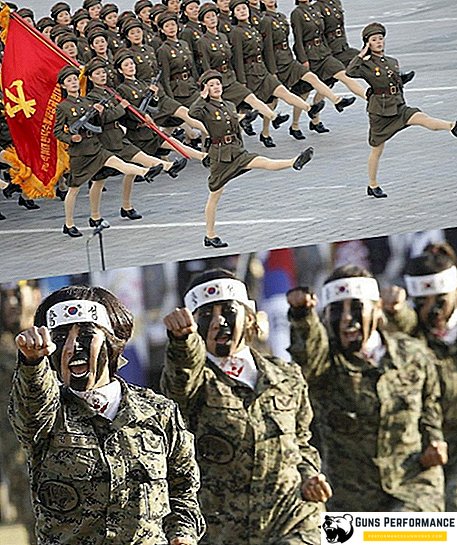
The American nuclear aircraft carrier Carl Vinson is heading to the shores of North Korea, and later the Nimitz and Ronald Reagan will join it. Each of these ships can carry about 100 aircraft and helicopters of various types. China has stopped civil aviation flights to the DPRK, and today the North Korean representative to the UN said that the prospect of nuclear war is closer than ever. Despite this, the DPRK refuses to stop nuclear and missile tests.
Everyone has become accustomed to the fact that once in a year or two on the Korean peninsula an aggravation begins. Another Kim threatens to shoot something kiloton at his closest neighbors or, in general, to launch a full-scale war with the damned imperialists. Each time, playing an extreme degree of inadequacy, the DPRK leadership tries to make its counterparts more compliant, and, as a rule, it does it well. But then the spit fell on a stone, and even more: the aggressive military rhetoric now comes not from Pyongyang, but from Washington.
The 45th President of the United States, Donald Trump, apparently liked to feel like a real cowboy. The sudden “Tomahawk” strike on Shairat made the top Russian leadership with a longing recall the ever-troubled Obama with his red lines and radically changed the layouts in the Middle East. It seems that Mr. Trump seriously decided to take part in the competition for the title of the most "frostbitten" leader of the modern world. In this case, he faces a serious struggle, because there are more than enough contenders for this place today. Is it possible to repeat the Syrian scenario in the Far East? And how can this threaten the world and the region?
Little blood and foreign territory

The newly elected US president is going through not the best of times. Scandalous resignations of closest advisers, judicial cancellations of the most important presidential decrees, constant accusations of excessive sympathy for Vladimir Putin. All of this has hit Trump's rating domestically. The American leader decided to look for a way out of this not very comfortable position on the international arena: on April 7, two American destroyers launched a sudden rocket attack on an air base in Syrian Shairat. 59 Tomahawk cruise missiles turned into scrap metal most of the aircraft located at the base, and almost completely destroyed its infrastructure.
Coming out of a small stupor, the Western world as a whole approved the actions of the Americans. They reacted positively to the missile attack on Syria and the leaders of most countries of the Middle East. Trump's rating inside the US went up sharply.
And two days after the missile strike, the US Navy nuclear aircraft carrier Carl Vinson abruptly changed the route and went to the shores of North Korea. The Americans said they no longer intend to endure the tests of Korean nuclear weapons and the launch of ballistic missiles. This is the background of the current Far Eastern exacerbation, now let's try to predict what its outcome will be.
Trump during the election campaign paid much attention to the DPRK and complained about the toothlessness of Obama’s policy regarding the North Korean regime. However, pre-election rhetoric is one thing, and real life is quite another.

Donald Trump now needs a small victorious war, with a minimal number of casualties among the US military and impressive results. "With little blood and on foreign territory", - as they once said in the USSR. But this is definitely not about the DPRK.
Will the United States together with the South Koreans and the Japanese (Japan will definitely be involved in this hypothetical conflict) be able to defeat the “Juche country”? This is beyond doubt. But what will the victory in this war cost, and then what will winners have to face?
North Korea began to prepare for the upcoming battle with South Korea and the United States immediately after its appearance on the political map of the world, back in the 50s. The fact that it will take place sooner or later, the North Koreans never really doubted. Over the past decades, an extremely authoritarian, extremely militarized state has been built north of the 38th parallel, whose ideology is built on a constant threat from the outside.

The population of the DPRK is a little less than 30 million people, while the country's army is one of the largest on the planet - in 2012 its number was 1.2 million people. North Koreans have about 4 thousand tanks, more than 10 thousand artillery guns, 2.5 thousand MLRS. The DPRK air forces have about 600 aircraft, as well as a large number of different air defense systems, from the very ancient Shilok to the Soviet S-200 air defense missile systems. Most of these weapons are physically and morally obsolete Soviet or Chinese samples, but their total number is still impressive. The experience of many conflicts shows that with the right level of motivation, you can successfully fight even with outdated equipment. And with the motivation of the North Koreans, everything is just fine.
You can also add that the mobilization resource of the country is 6.2 million people, and only 10 million people are suitable for military service. Another interesting fact: the number of North Korean special forces is estimated from 80 to 120 thousand people. In the event of war, these people will engage in sabotage and arrange a real guerilla in the rear of the enemy.

However, the complexity of a potential war with North Korea is not only in the large number of weapons that the country possesses. Saddam Hussein also had mountains of Soviet weapons, but this did not stop the Americans from carrying out the Iraqi army twice. However, in the event of the outbreak of hostilities on the Korean Peninsula, the territory of South Korea, including its capital Seoul, as well as the US military bases, would be under attack. Moreover, Seoul may even be covered with artillery fire from the territory of the DPRK.

But that's not all. Since 2005, the DPRK has officially been a nuclear state. Create a nuclear weapon Koreans helped the USSR. From the mid-1950s, the Soviet Union sent nuclear specialists to the DPRK, established a nuclear center in Yongbyon, and three years later transferred the nuclear reactor IRT-2000 to the Koreans. Geologists from the USSR found rich uranium deposits in the country.
The exact number of nuclear charges at the disposal of the DPRK leadership is unknown, but the South Korean military believes that Pyongyang could have accumulated nuclear materials to create 60 warheads. In 2018, Kim Jong-un said that his country had thermonuclear weapons, but not all experts are sure of this.
In the late 1960s, Korean specialists began working on the development of rocket weapons. In this aspect, the USSR also provided the DPRK with all possible assistance. In the early 1970s, North Korea began cooperation in the development of ballistic missiles with China. For many years, Iran has been cooperating with the DPRK in this area, several Korean missiles were adopted by the Iranian army.
Currently, North Korea has an impressive rocket arsenal. It includes both short-range ballistic missiles, Hvason-11 (analogous to the Soviet Tochka-U), Hvason-5, Hvason-6, and medium-range missiles (Hvason-7 and But-Dong-2 "). The range of their flight reaches 2 thousand km. In addition, now the Koreans want to test the first intercontinental missile "Hwaseong-13", which is able to fly to the United States. The exact number of missiles in service with the army of the DPRK is unknown, but it is accurately measured in hundreds of units. The entire territory of Japan and South Korea is within the reach of North Korean missiles.

Elements of the American missile defense system are deployed in South Korea and Japan, in particular the THAAD and Patriot PAC-2 complexes. The Aegis anti-missile system is deployed on Japanese and South Korean ships. But can these forces be guaranteed to intercept all missiles? Especially those who will have a nuclear warhead?
It should be noted that the current aggravation between Pyongyang and Washington is far from the first. Moreover, before the passions were seething with serious, and newspaper editorials were full of headlines about the beginning of the Third World War. There is information that soon after the collapse of the USSR, in 1994, the lover of the saxophone and connoisseur of young practitioners, Bill Clinton, seriously considered the possibility of solving the North Korean issue by force. The commander of the American troops on the Korean Peninsula, Gerry Luck, and the chairman of the joint chiefs of staff committee, General John Shalikashvili, prepared a report for the president, which contained a likely forecast of the military campaign. According to this document, already in the first month of the war, the loss of the American army will be about 50 thousand people killed and wounded; among South Koreans, this figure will be about half a million. In general, the loss of the United States in the war against North Korea will be about 100 thousand people, and South Korea - 900 thousand people. According to the generals, the war will cost US taxpayers $ 1 trillion.

It is possible that these figures are exaggerated. But if you take into account such predictions, then no American president will start the Second Korean War, being in a sober mind and sound memory. To take such a step, he must have "reinforced concrete" bases, even more abruptly than an attack on the American fleet in Pearl Harbor.
The Chinese chairman Mao once said that a nuclear war in the Pacific region would cost humankind 100 million lives. Since then, much has changed, but to complete the Korean crisis, which began almost 70 years ago, a little blood will not come out for sure.
It should not be forgotten that a strike against Korean nuclear facilities could turn a significant part of the region into a huge Chernobyl zone.
"Cherry on the cake"
There are other aspects that need to be taken into account when we talk about the possible consequences of a war on the Korean Peninsula.
Remember the year 1998. It was the Asian financial crisis that became one of the main reasons for the default that brought down the Russian economy. And imagine what will happen to the world economy in the event of a full-scale conflict in the region. And what will happen to the global financial markets if rockets with a nuclear warhead fly towards the Tokyo Stock Exchange. It doesn't matter if they are shot down or not. In this hypothetical conflict, three first world economies will be involved to one degree or another: the USA, China and Japan. The crisis of 2008 may seem to us all a children's matinee.

And the last aspect. Americans have learned quite well to fight. Two Iraqi campaigns in which they carried out one of the strongest armies of the region through one gate proved this. However, the political consequences of these wars are still being torn down by the world. Iraq, which was under tight control, even if it was not a very good person, was plunged into chaos. And the decision of the Nobel Peace Prize laureate Barack Obama to withdraw American troops from Iraq led to a complete disaster - the emergence of an Islamic state.
What to do with North Korea after the "forces of light" win and bring down the Kimov regime? Now North Korea is one of the most totalitarian states in the world. With concentration camps, regular famine (very similar to the early USSR), with a population whose brains were washed for a decade with very tough propaganda. Can South and North Korea unite in one state? Theoretically, yes. But, as the experience of combining the GDR and the Federal Republic of Germany shows, it is very difficult.

After the fall of the Berlin Wall, the West Germans invested huge amounts in the development of East Germany. New enterprises were built, the Soviet "Khrushchev" was reconstructed, the roads were repaired. And despite the fact that the GDR was a fairly rich country, a "showcase of the Eastern Bloc". It was even harder with the consciousness of the Germans, both “Western” and “Eastern”. There was a strong mutual rejection. However, they did not fight with each other. In order again to mentally become one nation, it took the Germans a couple of decades. How much money will be needed to turn the DPRK into a normal country, and after how many years will its people be able to recover from the effects of monstrous propaganda?

However, despite the complexity of the "North Korean" problem, the world will still have to solve it. The existence in the XXI century of a large country with a multi-million population, whose leadership has brought it to poverty, hunger and concentration camps, is a real shame for the world community. Moreover, if the hereditary dictators of this country have taken into the habit of constantly threatening their neighbors with nuclear Armageddon. For this problem, there are definitely no absolutely good solutions. Most likely, you will have to choose between just bad and very bad. But the further the world tolerates Kimov and makes concessions to them, it will be more difficult to correct this problem.


